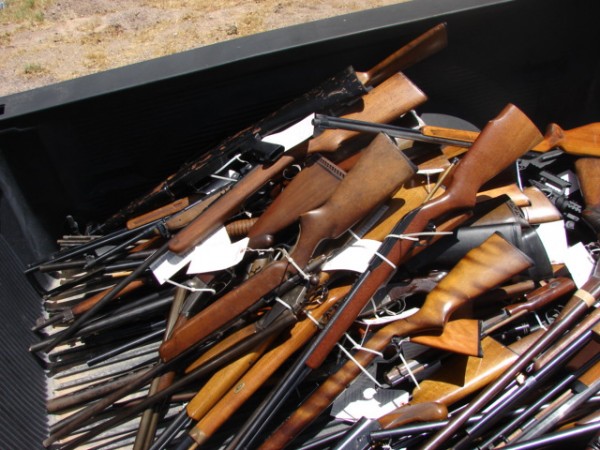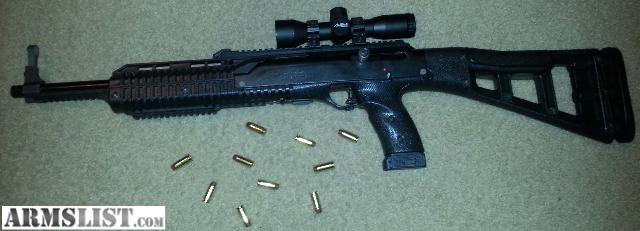
Posted on 03/14/2015 12:22:59 AM PDT by 2ndDivisionVet

There are at least four model 60 Marlins or variants in this photo from a gun “turn in” in Phoenix two years ago. The people turning in the rifles might well have paid less for the rifle new, than it brought at the politically correct turn-in.
I just listened to a recording of the Ferguson police shooting. It was not clear what direction the shots came from, or how far they were from the person doing the recording. But the cadence of the shots, and the information about what happened to the police give plenty to speculate on. I do not claim any inside sources from Ferguson, or any knowledge about the evidence collected there. So, here are SWAGs (Scientific, Wild, After the fact, Guesses.
First, from the nature of the wounds, given that a bullet was said to be lodged below the ear of one officer, and that both officers were released from the hospital in less than a day, it was almost certainly a .22 rimfire that was used.
This makes sense, as it is the most common cartridge in the country, even with the run on .22 long rifle cartridges for the last two years. About four billion of these cartridges are sold and used in a “normal” year. In the last couple of years that number is closer to 5-6 billion. The demand in the United States has far outstripped supply; we are importing all that can be produced overseas, and begging for more. The common .22 long rifle round has plenty of power to do the damage being talked about to a few hundred yards. Hitting a small target past 300 might be a little difficult, but from 100 to 150 yards, as is mentioned in the Ferguson shooting, it would not be a problem.
The .22 long rifle has another “fit” to the shooting. From the recording, my best SWAG is that three shots were fired. The person doing the recording turns 90 degrees in the middle of the shooting, and because of the changed direction of the mike, the middle shot seems to produce more echoes. I believe that it was three shots, and the time would be 3 seconds, start to end.
Shooting aimed shots that fast is not impossible from a good, supported position, and it is much easier if you are shooting a firearm with almost no recoil, such as a .22 rimfire rifle. Put a scope on the rifle, and relatively precise aiming at 125 yards is pretty simple. It is almost as easy to do with open sights, if you are young and your eyes are good. Hitting an 8″ target at 150 yards is well within the grasp of most people, with the most basic instruction. While recorded sounds can be tricky, the shots do not sound loud enough to be more powerful than a .22 long rifle cartridge.
These rifles and the telescopic sights for them are ubiquitous in American society. They are almost never used in crime because they are hard to conceal, and relatively low powered. All body armor will stop these rounds easily.
My guess is that one officer was targeted and hit with the first shot; the other two shots went a bit wild, one missing and the other hitting the second officer by chance. While virtually all .22 repeating rifles can be fired as fast as the shots timed in the recording, the most common .22 rifles sold are .22 semi-autos. They are the easiest repeater to manufacture and the most popular. I will even venture a prediction as to the model and manufacturer.
It was probably a Marlin Model 60 or variant. 11 million have been sold of just this one model. Many are sold with an inexpensive telescopic sight. They used to be the most popular rifle in the United States, before concern about a potential “assault weapon” ban drove AR-15 type rifle sales through the roof. They are likely one of the most common guns stolen, because there are so many of them. I do not mean to slight the Ruger 10-22, with more than 5 million sold, or the numerous Savages, Springfields, Winchesters, Remingtons, Nobels, Brownings, Smith & Wessons, or numerous other brands that have been sold over the last century while the .22 rimfire semi-auto has been popular. No one knows how many there are in existence. Up until 1968, no serial numbers were required, and for good reason. As stated, they are almost never used in crime.
A conservative estimate would be something in excess of 25 million of these semi-automatic rifles in existence, perhaps as many as 50 million. They are very popular, inexpensive, and useful. With just a little care, they last almost forever. The mild .22 LR cartridge is easy on the actions and the bore.
Marlin makes a great all around useful rifle for the price, a superb example of capitalism making excellence available to the common man. It will be sad if they receive any blame for the actions of socially irresponsible criminals.
so now everyone is a crime scene tech and an expert on how body parts like bones, cartilage and muscle effect the movement of projectiles through human tissue.
This is why I hate TV...
Three shots. Three seconds. Sounds like an AR 15-10 to me. But what do I know.
I disagree. Most I have seen have to look at the rear of a shell case to know the caliber.
In my expert opinion, it was not a .50 BMG.
My first tube-fed 22 rifle was a Ted Williams, back in the ‘60s. I remember my father taking me to the gun counter at Sears. It showed up under the Christmas tree...from Santa.
I still have it, although it’s in pieces.
Sounds like more logic from the Obama war room.
Indeed. Add in the stress associated with shooting at people and the need for exfiltration, and I think you're dealing with an experienced hand.
“I disagree. Most I have seen have to look at the rear of a shell case to know the caliber. “
I did not write that the police can know the precise caliber simply by listening to it.
I did indeed write that many can differentiate .22LR from a high powered centerfire cartridge like .223 or larger. .22LR sounds nothing like those more powerful cartridges. If you are around them enough, you certainly can hear the difference.
Not to argue too much, but an AR has almost no recoil. I could have done that with an AR-15 without any trouble.
Update: there’s at least one report of 40 caliber bullets being used.
A spokesman for the St. Louis Police Officers Association, Jeff Roorda, says that “it appears” the police officers were shot with 40 caliber bullets.
http://www.msnbc.com/morning-joe/watch/police-spokesman-discusses-dead-cops-remark-412716611767
okay, so I’m going to display my ignorance. what rifles shoot .40 caliber bullets?
The Germans captured a lot of Thompsons from the French and British early in the war, and from the Americans also, later. I’ve seen photos of German troops carrying Thompsons, usually guard troops, since ammo was a specialty item.
The front sight on the rifle on the bottom of the pile looks Polish, Spanish, or German.

One example: Hi Point .40 carbine. About $329.00.
Recorded shots cannot be identified. Recording equipment does not record full spectrum—shots and explosions all sound small. That’s why Hollywood employs Foley artists.
“okay, so I’m going to display my ignorance. what rifles shoot .40 caliber bullets?”
For .40 Smith & Wesson, there are a couple of carbines out there.
http://www.hi-pointfirearms.com/Hi-Point-carbines/40SW_carbine.html
Just to clarify, my comments about police identifying .22LR by ear was only for police on the scene who heard it live.
Thanks. The guy with the Thompson was guarding a bridge crossing, with a couple of others carrying MP-38 or 40’s. I saw the muzzle....definetly not K-98. That’s why I always look to see if I can ID Schulz’s gun. He always drags it around by the muzzle and I couldn’t tell.
Disclaimer: Opinions posted on Free Republic are those of the individual posters and do not necessarily represent the opinion of Free Republic or its management. All materials posted herein are protected by copyright law and the exemption for fair use of copyrighted works.